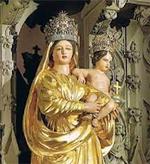Benedict XVI breaks silence, addresses Italian non-believer
September 24, 2013
Pope-emeritus Benedict XVI has broken his public silence for the first time since his resignation, with a lengthy letter to an Italian intellectual.
The retired Pontiff wrote an 11-page personal letter to Piergiorgio Odifreddi, the author of a book responding to Benedict’s Jesus of Nazareth. With Benedict’s permission, substantial portions of the letter have been published in the Italian daily La Repubblica.
For La Repubblica, the letter from Benedict XVI was the 2nd lengthy contribution from a Roman Pontiff in recent days. Earlier this month the paper published a long letter by Pope Francis, responding to an editorial comment by Eugenio Scalfari. In each of these cases the papal message was addressed to a prominent Italian non-believer, and the appearance of the second letter, from Benedict XVI, has prompted speculation that the past and president Pontiffs are coordinating their efforts to reach out to a secular audience.
In his letter to Odifreddi, Benedict XVI welcomes an “open dialogue” on questions of faith, and addresses the Italian writer’s points on Biblical scholarship and the understanding of Jesus. The retired Pontiff strongly defends the role of faith as a companion of scientific reason, and questions whether secular scientists sometimes overreach the boundaries of their own fields, venturing into “science fiction” to explain matters that strictly empirical analyses cannot explain.
Benedict takes Odifreddi to task for using mathematical logic as, in effect, his own religion. He remarks: “I’m amazed that with one stroke you eliminate freedom, which… is the fundamental principle of the modern era.”
Pope-emeritus Benedict also addresses the sex-abuse crisis in the Catholic Church, and his own role in addressing the scandal. “I never tried to cover up these things,” he assures Odifreddi.
The retired Pope reminds Odifreddi that sexual abuse is not a problem unique to the Catholic Church. He points out that the proportion of priests guilty of abuse is similar to the proportion of abusers in other fields—although he concedes that this is not a comforting statistic. He concludes that “one must not stubbornly present this deviance as if it were a nastiness specific to Catholicism.”
For all current news, visit our News home page.
Further information:
- 'I never tried to cover up abuse,' Benedict insists (National Catholic Reporter)
- Ex-pope Benedict denies covering up sexual abuse (Reuters)
All comments are moderated. To lighten our editing burden, only current donors are allowed to Sound Off. If you are a current donor, log in to see the comment form; otherwise please support our work, and Sound Off!







